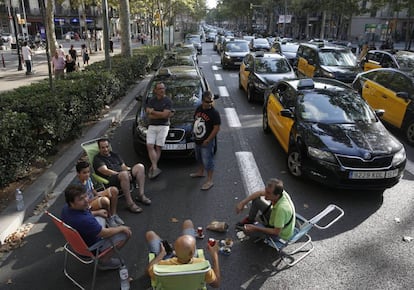The future of taxis in Spain
Ongoing street protests are harmful to both the industry and passengers

As was feared, the taxi strike has spread to many Spanish cities – taking a heavy toll in Barcelona and Madrid, where main thoroughfares have been literally occupied by protesting taxi drivers – and threatening to break down major transportation hubs like airports and train stations during Spain’s peak summer season.
The causes of this crisis are neither new nor outrageous. They stem from a poorly resolved conflict – one that’s been addressed with notable indifference even though it was forewarned – between taxi associations, the traditional mode of private transport, and chauffeured vehicles, known as VTCs, which operate via digital platforms and are a direct competition to taxis. This is the root problem. Taxis believe they are suffering from unfair competition and want stricter regulation.
Taxi associations have to accept that while their demands may be legitimate, they have to be addressed through negotiation
The reason why the conflict has exploded now is because the National Markets and Competition Commission, and the Public Works Ministry, blocked an agreement between the Metropolitan Area of Barcelona (AMB) and taxi associations to limit VTC licenses to one for every 30 taxis. But the response of taxi drivers to this decision has been excessively violent and quite inappropriate for a labor group that is meant to believe in negotiation. The ongoing negotiations with the Public Works Ministry look to reach an agreement on the 1-to-30 ratio, hand over powers to regulate urban transportation to regional authorities, and establish the AMB agreement as a model to follow by all Spanish regions.
But it is not reasonable (or acceptable) to negotiate under the pressure of a violent street protest. This is called intimidation. For an agreement to be reached it is imperative that the protesters guarantee that there will not by any violent acts against their competitors Uber or Cabify. Taxi associations have to accept that while their demands may be legitimate, they have to addressed through negotiation.
Nor is it reasonable to immediately reject the Public Works Ministry proposal to approve a decree that would recognize the one VTC license for every 30 taxi licenses rule from September 14. This distrust fuels the conflict. Continuing the protests in the street, where it is easy for violence to break out, is not the best way to defend the future of taxis. An agreement is possible, it is nearly there, and it must not be derailed by secondary issues.
Taxis are right about one main point: VTC companies are transportation companies, and as such they must comply with the same norms as taxis. This premise has to be recognized and strictly laid out in regulation. But, by the same token, taxis must also recognize that VTCs are here to stay and that, thanks to them, the urban transportation market has improved. The user, who doesn’t understand the violence or the loss of such an essential service, is not going to give up the convenience of these platforms. If this fact causes more sporadic and vitriolic protests, taxi drivers will no longer be in the right. And, of course, taxi regulation must also include systems to avoid speculation with the price of licenses.
English version by Melissa Kitson.
Tu suscripción se está usando en otro dispositivo
¿Quieres añadir otro usuario a tu suscripción?
Si continúas leyendo en este dispositivo, no se podrá leer en el otro.
FlechaTu suscripción se está usando en otro dispositivo y solo puedes acceder a EL PAÍS desde un dispositivo a la vez.
Si quieres compartir tu cuenta, cambia tu suscripción a la modalidad Premium, así podrás añadir otro usuario. Cada uno accederá con su propia cuenta de email, lo que os permitirá personalizar vuestra experiencia en EL PAÍS.
¿Tienes una suscripción de empresa? Accede aquí para contratar más cuentas.
En el caso de no saber quién está usando tu cuenta, te recomendamos cambiar tu contraseña aquí.
Si decides continuar compartiendo tu cuenta, este mensaje se mostrará en tu dispositivo y en el de la otra persona que está usando tu cuenta de forma indefinida, afectando a tu experiencia de lectura. Puedes consultar aquí los términos y condiciones de la suscripción digital.








































